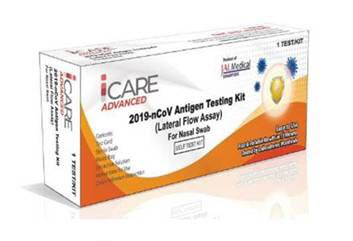Table of Contents
As Laos continues to manage the long-term impacts of COVID-19, interest in accessible, rapid diagnostic solutions has grown. Among these, iCARE COVID-19 Test Kits – designed for home use – offer a promising approach. With minimal technical requirements, these test kits can deliver results in just minutes, providing a convenient alternative for individuals unable or unwilling to visit a medical facility. However, questions remain about the feasibility, reliability and regulatory support for such home testing methods within the Laotian healthcare system.
This article explores the potential role of iCARE’s COVID-19 diagnostic kits in Laos, examines how these kits function, highlights the benefits and limitations of home-based testing and discusses the current regulatory environment and public health considerations.

Understanding iCARE COVID-19 Test Kits
The iCARE COVID-19 Test Kit is an immunochromatographic assay that detects IgG and IgM antibodies specific to SARS-CoV-2, the virus responsible for COVID-19. These antibodies develop after infection – IgM appears early and fades relatively quickly, while IgG typically emerges later and persists longer.
Each kit includes a test strip pre-coated with anti-human IgM and IgG antibodies. When a blood, serum or plasma sample containing COVID-19 antibodies is added, a colored line appears in the respective IgM or IgG region of the strip. This simple mechanism allows users to determine possible past or recent infection.
Importantly, these kits are not intended for diagnosing active COVID-19 cases during the early infection period. For that, a Covid antigen test kit is more appropriate as it detects the presence of viral proteins rather than the body’s immune response.
Key Advantages of Home-Based COVID Testing
Speed and Accessibility
One of the strongest advantages of the iCARE Coronavirus Test Kit is its rapid turnaround time – delivering results in approximately 10 to 15 minutes. This is especially beneficial in rural or underserved regions of Laos, where access to centralized testing facilities may be limited.
Ease of Use

The iCARE test kit is designed for self-use and requires no laboratory equipment. Clear instructions enable users to safely collect their sample and interpret results without the assistance of a healthcare worker.
Minimizing Exposure Risk
Home testing may reduce the potential exposure of individuals to COVID-19 by eliminating the need to travel to clinics or testing centers, particularly during outbreak surges.
Limitations and Cautions
Despite the advantages, home testing without healthcare supervision also presents several challenges:
Accuracy and Reliability
Antibody tests like the iCARE kit may not detect the virus in its early stages. A person exposed within the past few days may test negative, even if infected. Additionally, improper sample collection or test handling can reduce accuracy.
Interpretation of Results
A positive IgM result may indicate a recent infection, but not necessarily an active one. Similarly, a positive IgG result may simply suggest past exposure. Without medical guidance, users may misinterpret these results, leading to unnecessary concern or a false sense of security.
Regulatory Restrictions in Laos
As of 2025, Laos does not permit the sale or distribution of COVID-19 rapid diagnostic kits for home use due to concerns over test validity and the absence of healthcare support.
The Role of Covid Rapid Testing in Laos’ Public Health
The importance of Covid rapid test kits during the pandemic cannot be overstated. Globally, they have enabled large-scale screening, timely isolation of positive cases and effective contact tracing. While not suitable for every scenario, especially early infection detection, they offer substantial value in:
- Supporting post-infection surveillance
- Enabling community-level testing campaigns
- Assisting travelers or frontline workers with quick results
- Identifying seroprevalence rates in population studies
In Laos, incorporating validated, high-quality Covid-19 test kits may support broader public health goals if integrated carefully into national testing strategies
Requirements for Safe Home Testing Implementation in Laos
To consider future use of iCARE or similar Coronavirus Test Kits in a home setting, Laos would need to establish certain safeguards:
- Regulatory Approval: Only test kits reviewed and approved by the Ministry of Health should be permitted for home use.
- Clear Instructions: Kits should include user manuals in Lao language with step-by-step guidance and safety warnings.
- Reporting Mechanisms: Individuals should be able to report results to local health authorities or seek confirmatory testing where needed.
- Public Education: Mass awareness campaigns are essential to ensure people understand the purpose, limits and next steps after testing.
- Integration with Care Services: Positive results should be linked to available treatment or quarantine resources, especially in remote provinces.

Can Home Testing Work Without Healthcare Professional Support?
While self-testing can reduce pressure on healthcare systems and increase access to diagnostics, its effectiveness hinges on public understanding, test reliability and policy infrastructure. In settings like Laos, where healthcare literacy and infrastructure vary widely, oversight and support mechanisms are critical.
If the country moves toward legalizing and regulating home testing kits like those from iCARE, the process must prioritize test accuracy, training and integration with national health responses. This ensures that the convenience of self-testing does not compromise public safety or the effectiveness of disease surveillance.
Conclusion
COVID-19 Test Kits represent a valuable advancement in personal diagnostics, with potential to enhance testing accessibility in Laos. However, until they are officially approved and integrated into the national healthcare framework, their use remains restricted.
Laos must weigh the benefits of home testing – such as convenience and faster access to results – against challenges like accuracy, misinterpretation and lack of follow-up care. For home-based diagnostics to succeed in Laos, a robust, evidence-based policy and public health approach is essential.
iCARE COVID-19 Test Kits: Home Testing Without Healthcare Professional Support in Laos?
Are iCARE COVID-19 Test Kits allowed in Laos?
As of now, rapid diagnostic kits for home use, including iCARE kits, are not permitted for sale or use in Laos due to reliability and regulatory concerns.
How accurate are these test kits?
When used correctly, iCARE antibody tests can be highly sensitive. However, they are not suitable for diagnosing recent infections and must be interpreted cautiously.
Can I use this test without medical supervision?
Yes, the kit is designed for self-use. However, users must carefully follow instructions and understand the implications of results.






